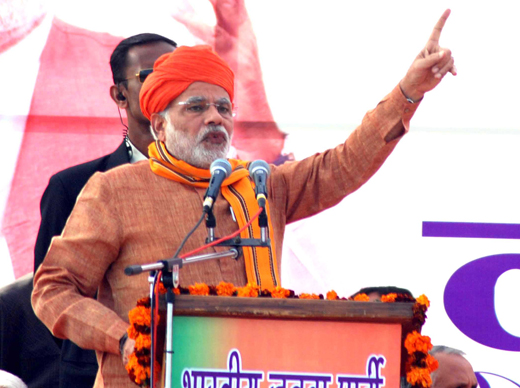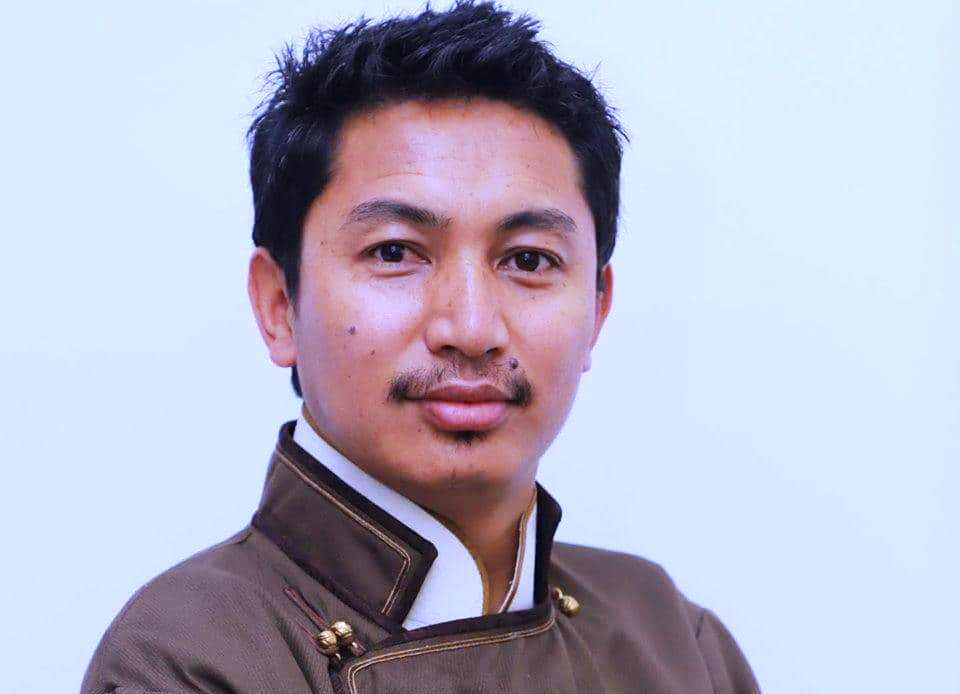In anticipation of the general elections as the ruling BJP lost assembly polls in five states, contested on basis of Ram Janam Bhoomi and Hindutva planks, there are apprehensions that rightwing may now focus on Kashmir, reports Masood Hussain

“Itna Sanata Kyoun Hai Bhai”, a politically conscious Kashmiri citizen wrote on his wall, moments after he landed in Jammu. It was the day when BJP suffered a setback in the five states that went to polls, pushing Congress to No 1 position in four states. “The silence on the streets was enigmatic and disturbing,” he later told this reporter.
Rightwing politics in Jammu has remained technically the mainstream politics for most of the last 70 years. At one point of time, Jammu was the fountain of Sangh politics till Nagpur took over. Despite this importance, Jammu had not had enough of stakes in the state’s power structure till 2008 took place and the party built on that brick by brick. In 2014, it reached a status that Jammu region gave it a landslide mandate and made it part of the ruling coalition that collapsed under its own weight, this past summer. As the Modi wave is apparently subsiding, the tensions are quite obvious.
“It is too early to say anything,” a senior politician from Jammu said. Speaking off the record, the former minister said, the “tensions within the cadres are visible” but there is a long time between these verdicts and the general elections, early next year. “The state politics is so unpredictable that anything can happen in between.”
The party has faced certain problems in the just concluded Municipal polls, which, unlike Kashmir, witnessed mass participation in Jammu. “They took most of the seats but nobody pointed towards the fact that BJP vote share fell by almost 51 per cent,” the politician said. “In fact, the Congress was not the gainer at all because they also compromised their vote share by almost 21 per cent.” In the 75-seat Jammu Municipal Corporation (JMC), BJP had 43 berths; Congress had 14 as 18 were independents.
The region is witnessing a crisis within. In at least four municipalities in and around Kathua, the BJP faced a serious crisis as a party “rebel” Choudhary Lal Singh ensured the party’s official candidates are not elected. BJP lost leadership of all these four municipalities. The political grapevine is that Singh is working overtime to create a sort of a political alternative to the BJP.
“There were problems within the Sangh as well,” the politician said. “The RSS had apprehensions that the BJP may face the music for that crucial position, they had nominated their own men.” One of them was a bank employee who was fielded to win the poll and eventually takes over as the Jammu Mayor. “He lost the election and BJP prevailed,” the politician added. It was finally the BJP candidates, Chander Mohan Gupta and Purnima Sharma, who were installed as Mayor and Deputy Mayor of Jammu Municipal Corporation. “But the cadres are generally demoralised after the recent elections in five states. There are some more state elections around the corner and they can add to the crisis the rightwing is in.”
BJP in Jammu is facing the crisis on the delivery front. They got landslide mandate but failed to deliver on the promises they had made during campaigning. They ran into controversies and it reached a situation that two ministers had to put in their papers in wake of the kidnapping, gang rape and murder of a Bakerwal girl in a Kathua village.
More recently, the party has started facing the music from one of its former MLAs’, Dr Gagan Baghat. The lawmaker was facing a crisis within the party as he emerged as a “romantic” after a parent accused him of taking away his daughter. After governor Satya Pal Malik dissolved the House, Baghat challenged the decision in the Supreme Court that was dismissed. In a quick follow-up, the party expelled Baghat from the party. He was the only person from the Parivaar who opposed fiddling with Article 35-A of the Constitution of India and now accused of talking ‘NC language’.
The party’s emergence in the power corridors is now being seen as a factor of imbalance in state politics and nobody will be shaking hands with them after the fall of BJPDP coalition. This may or may not impact the ultimate outcome but this is what is being talked loudly these days.
Ladakh was a shattering event in BJP’s state history. The Sangh has been working in the region, more specifically in Leh where it literally took over the leadership of the so-called Sindhu Darshan as it suits its ideological requirements. All the efforts including the multiple visits of the Prime Minister Narendra Modi helped the Parivaar win the last Lok Sabha polls, almost by a whisker, but it failed to retain the region and consolidate it. Recently, it led to the resignation of Thusptan Chewwang, the MP, from the party fold.
Now the Leh has revived its Union Territory demand. Recently the region’s population came on roads, seeking a full-fledged university and a division status. This has triggered demands by people that on the basis of difficulties, geography and the accessibility, the Pir Panchal (Rajouri and Poonch) and the Chenab Valley (Doda, Kishtwar, Reasi and Ramban) regions should also be considered for a similar status.
The party’s position in neighbouring Kargil has gone lower. Twin polls for the local municipality and the Ladakh Autonomous Hill Development Council (LAHDC) Kargil exhibited enough to tell the BJP’s investment in the arid region has not been as productive as the bosses were expecting.
In Kashmir, the situation is completely different. In a hugely-boycotted municipal poll, the BJP managed to elect its members to various municipalities within and outside Srinagar, but the party is not in a position to have any respectful numbers in the fast-approaching assembly polls. In fact, it is the association of the party with the Peoples Democratic Party (PDP) that the latter is facing a literal existential threat. Almost on daily basis, there are reports that the people are leaving the party. The situation has checkmated the political class. In near future, no political party will find itself in a position to ally with any rightwing force that has the dilution of worn out autonomy as part of its formal or informal election manifesto.
“We are happy that we have separated (from BJP),” Naeem Akhter, former minister and the party ideologue, said. “Had we still been in the coalition, we may not be able to offer any reasoning for what happened to BJP in these states.”
Akhter said the verdict from the five states has two sides. On the face of it, it is clear that the voters have refused to get obliged by Hindutva sentiment, the Ram Janam Bhoomi and the torture to minorities. “They want people to deliver and not get into the sloganeering,” Akhter said. “On the flip side is a tension that since every cord is breaking, the Parivaar should not invoke Kashmir and go to the next general polls.”
“It is not difficult to stoke the communal fire since India is a semi-feudal country and the fuel of communalism is always present in it, only waiting to be ignited by some spark. So, we are bound to witness widespread communal riots and incidents in the coming months,” former Press Council of India Chairman Markandey Katju wrote in his column in The Week. “Also, a war with Pakistan on some issue is bound to whip up communal passions, and our leaders may well resort to that option too.”
Kashmir has remained a key agenda of the Parivaar. It does not want any special treatment to Kashmir and has already gone to the Supreme Court against certain provisions that the state still retains. It also does not want any protection to the state’s demography. In desperation, can the BJP change some of the provisions during president’s rule and hawk it as part of the achievement in the general elections?
All the Kashmir parties have been seeking a friendly relation with Pakistan. There have been certain abortive efforts in past. The BJP is unlikely to resume the routine in diplomacy. Instead, it has released videos of “surgical strikes” in the public domain that is now being criticised by the former Generals. Can BJP go for a limited war in such a situation ahead of polls? This is the question being asked on the ground.
But people close to power corridors in Delhi say the BJP defeat will not lead to war. Instead, they insist, the elections for the state assembly will take place in time.















